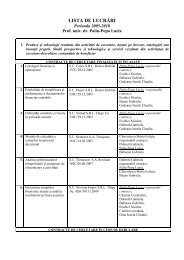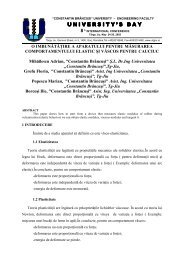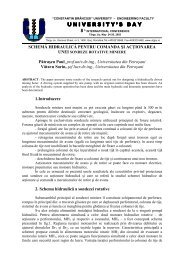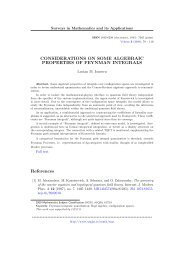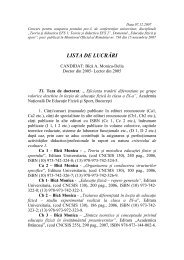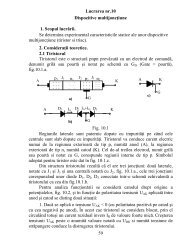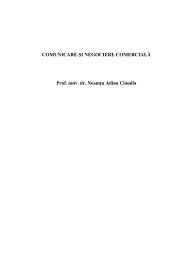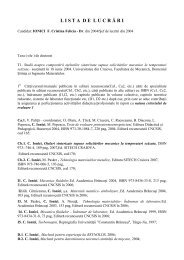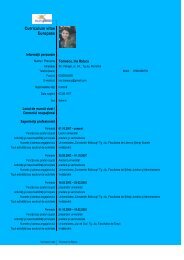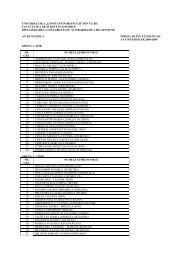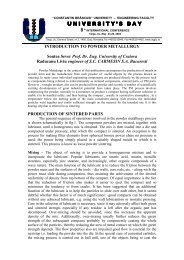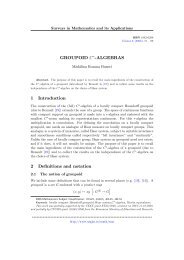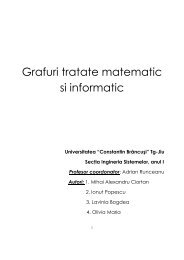Analele Universităţii “<strong>Constantin</strong> Brâncuşi” din Târgu Jiu, Seria Litere şi Ştiinţe Sociale, Nr. 2/<strong>2008</strong>o „cale regală”: ea este un moment alcunoaşterii umane supuse acţiunii posibiluluiistoric. În demersul pe care-l propunem, atât însurprinderea corelaţiilor dintre repereleconceptuale (cunoaştere epistemică – cultură -democraţie), dar mai ales în dezvoltareasecvenţelor de conţinut privitoare lademocraţia formală şi democraţia substanţială,a rolului cunoaşterii şi culturii politice înprogresul democraţiei (dar şi în evidenţiereaunor limite intrinseci „teoriei-fantomă” ademocraţiei) iterăm asumpţia că apreciereaunei concepţii gnoseologice doar sub aspectulcoerenţei şi simplităţii interne, al consecvenţeicu propriile ei premise teoretice şimetodologice, este cu totul insuficientă.În disputa dintre epistemé şi doxa(paradoxul lui Taminaux) trebuie ţinut seamade presupoziţiile premiselor, de consecinţelemai îndepărtate ale dezvoltării teorieidemocraţiei, de contextele extragnoseologice(ontologice, psihoantropologice) pe care leangajează.Tabloul contemporan al preocupărilorşi poziţiilor epistemologice este unul extremde variat. O participare la înţelegerea societăţiicunoaşterii presupune o analiză sistematicăprivind: marile transformări interne, de mod saustil de gândire produse în ştiinţa modernă şiactuală, dar mai ales analiza noului statutsocial-economic, cultural şi politic al ştiinţei încadrul societăţii informaţionale; noile metode şi mijloace care permitefectuarea cercetărilor teoretice (logicomatematice,semantice, metateoretice) şiempirice (psihogenetice, psihosociologice,istorice, antropologice, cibernetice etc.),altădată inaccesibile; tradiţiile filosofice şi culturale,curentele şi şcolile ştiinţifice contemporane(empirismul logic şi filosofia analitică – R.Carnap, C.G. Hempel; raţionalismul critic –K.R. Popper; fenomenologia – Ed. Husserl;neoraţionalismul – G. Bachelard, F.Gonseth;epistemologia genetică – J. Piaget;pragmatismul conceptual – W.v.O. Quine;noua tehnologie a ştiinţei – Th.S. Kuhn, St.epistemological prestige, even with aparadigmatic role.Knowing the knowledge has only one“royal” way: it is a moment of humanknowledge below the historical possibility. Inour steps, both in surprising the the correlationsbetween conceptual references (epistemicknowledge – culture – democracy), butespecially in developing the content sequencesregarding formal democracy and substantialdemocracy, the role of knowledge and politicalculture in the progress of democracy (but also inunderlining some intrinsic limitations of the“phantom-theory” of democracy) we issue theassumption that the appreciation of agnoseologic conception only under the aspect ofcoherence and internal simplicity, ofconsistency with its own theoretical andmethodological premises, is not enoughIn the dispute between episteme andgray matter (Taminaux’ paradox) we have totake into consideration the farther consequencesof democracy theory development, the extragnoseologiccontexts (ontological, psychoanthropological)it engages.The contemporary picture ofepistemological concerns and positions isextremely various. Participating inunderstanding the knowledge of societysupposes a systematic analysis regarding: great internal transformations, regardingthought style or form produced in modernand current science, but especially theanalysis of the new social-economic,cultural and political status of sciencewithin informational society; new methods and means allowing to carrytheoretical researches (logical andmathematic, semantic, meta-theoretical)and empirical (psycho-genetic, psychosociological,historical, anthropological,cybernetic etc.), which used to beinaccessible; Philosophical and cultural traditions,contemporary scientific trends and schools(logical empiricism and analyticalphilosophy – R. Carnap, C.G. Hempel;critical rationalism– K.R. Popper;Annals of the „<strong>Constantin</strong> Brâncuşi” University of Târgu Jiu, Series Letters and Social Sciences, No. 2/<strong>2008</strong>8
Analele Universităţii “<strong>Constantin</strong> Brâncuşi” din Târgu Jiu, Seria Litere şi Ştiinţe Sociale, Nr. 2/<strong>2008</strong>Toulmin; realismul „ştiinţific” – M Bunge, H.Putnam – contextualitatea adevărului – R.Rorty ş.a.); metodele, tehnicile şi instrumentelecare conferă cercetărilor epistemologici ungrad mai ridicat de pozitivitate, precum:analiza directă referitoare la problemeleepistemologice noi pe care le presupunepractica de vârf a cercetării ştiinţifice; analizaformalizantă şi reconstrucţia logicomatematicăatât a teoriilor ştiinţifice, cât şi aconceptelor epistemologice intuitive (teorie,model, explicaţie, predicţie, testare, adevăretc.); metodele istorico-critice şipsihogenetice (care pun în evidenţămecanismele de creştere a cunoaşterii şi modulistoric în care au evoluat şi s-au succedatprincipalele ipoteze etc) 5 .Natura pe care o studiază ştiinţele azi,nu este o natură ante-umană; ea este dejaprelucrată şi valorizată cultural. Sistemele desemnificaţii pot fi descifrate numai prin luareaîn consideraţie a contextului, apelând larezultatele cercetărilor din domeniulantropologiei culturale, psihosociologiei,istoriei culturii, punând accent pe cunoaştereapsihicului social în procesul de „refacere” aorizontului de realitate a oamenilor. În acestcontext apelează Mircea Eliade la termenul de„opacitate semantică” care semnifică faptul căorice document, chiar contemporan, este„spiritual opac” atâta timp cât nu estedescifrat”, integrându-l într-un sistem desemnificaţii: „O unealtă preistorică saucontemporană nu poate să releve decâtintenţionalitatea sa tehnologică: tot ceea ceproducătorul sau posesorii ei au gândit, auimaginat, au sperat în relaţie cu ea ne scapă” 6 .Într-o definiţie ce-i exprimă chintesenţaconţinutului, adevărul reprezintă valoareacunoaşterii. Modul de a fi al omului, condiţiaumană (Montaigne, Malraux), „fiinţăîntru´mister şi pentru revelare” (Lucian Blaga)– reprezintă fundamentele universuluiaxiologic uman. Aşa cum judecăţile de valoarenu se identifică cu judecăţile despre valoare, lafel universul axiologic nu se rezumă launiversul ontic, nici la cel gnoseologic. Şiphenomenology – Ed. Husserl; neorationalism– G. Bachelard, F.Gonseth;genetic epistemology – J. Piaget;conceptual pragmatism – W.v.O. Quine;the new technology of science – Th.S.Kuhn, St. Toulmin; “scientific” realism –M Bunge, H. Putnam – the contextuality oftruth – R. Rorty ş.a.); Methods, techniques, and instrumentsgranting the epistemological researchers ahigher degree of positivity, like: a directanalysis regarding epistemologicalproblems that the top practice of scientificresearch supposes; formalising analysis andlogical – mathematic reconstruction ofscientific theories, as well as of intuitiveepistemological concepts (theory, model,explanation, prediction, testing, truth etc.); Historical-critic and psycho-geneticmethods (that underline the growthmechanisms of knowledge and thehistorical way in which they have evolvedand succeeded their main hypothesesetc) 20 .The nature studied by sciencesnowadays, is not an anti-human nature; it isalready processed and culturally valued.Significations systems may be decrypted onlyby taking into consideration the context, callingthe results of the researchers in the field ofcultural anthropology, psycho-sociology, thehistory of culture, placing the accent onknowing the social psychic in the process of“rebuilding” people’s reality horizon. In thiscontext, Mircea Eliade uses the term of“semantic opacity” which means that anydocument, even contemporary ones, is“spiritually opaque” as long as it is notdecrypted, by integrating it in a system ofsignifications: “A prehistoric or contemporarytool only reveals its technological intentionality:everything its producer or owners have thought,have imagined, have hoped related to it isunknown to us” 21 .In a definition expressing the contentessence, truth represents the value ofknowledge. Man’s way of being, human nature,(Montaigne, Malraux), „mysterious being andfor revelation” (Lucian Blaga) – is the groundsAnnals of the „<strong>Constantin</strong> Brâncuşi” University of Târgu Jiu, Series Letters and Social Sciences, No. 2/<strong>2008</strong>9
- Page 5: CUPRINS:1. CUNOAŞTERE - CULTURĂ
- Page 8 and 9: Analele Universităţii “Constant
- Page 12 and 13: Analele Universităţii “Constant
- Page 14 and 15: Analele Universităţii “Constant
- Page 16 and 17: Analele Universităţii “Constant
- Page 18 and 19: Analele Universităţii “Constant
- Page 20 and 21: Analele Universităţii “Constant
- Page 22 and 23: Analele Universităţii “Constant
- Page 24 and 25: Analele Universităţii “Constant
- Page 26 and 27: Analele Universităţii “Constant
- Page 28 and 29: Analele Universităţii “Constant
- Page 30 and 31: Analele Universităţii “Constant
- Page 32 and 33: Analele Universităţii “Constant
- Page 34 and 35: Analele Universităţii “Constant
- Page 36 and 37: Analele Universităţii “Constant
- Page 38 and 39: Analele Universităţii “Constant
- Page 40 and 41: Analele Universităţii “Constant
- Page 42 and 43: Analele Universităţii “Constant
- Page 44 and 45: Analele Universităţii “Constant
- Page 46 and 47: Analele Universităţii “Constant
- Page 48 and 49: Analele Universităţii “Constant
- Page 50 and 51: Analele Universităţii “Constant
- Page 52 and 53: Analele Universităţii “Constant
- Page 54 and 55: Analele Universităţii “Constant
- Page 56 and 57: Analele Universităţii “Constant
- Page 58 and 59: Analele Universităţii “Constant
- Page 60 and 61:
Analele Universităţii “Constant
- Page 62 and 63:
Analele Universităţii “Constant
- Page 64 and 65:
Analele Universităţii “Constant
- Page 66 and 67:
Analele Universităţii “Constant
- Page 68 and 69:
Analele Universităţii “Constant
- Page 70 and 71:
Analele Universităţii “Constant
- Page 72 and 73:
Analele Universităţii “Constant
- Page 74 and 75:
Analele Universităţii “Constant
- Page 76 and 77:
Analele Universităţii “Constant
- Page 78 and 79:
Analele Universităţii “Constant
- Page 80 and 81:
Analele Universităţii “Constant
- Page 82 and 83:
Analele Universităţii “Constant
- Page 84 and 85:
Analele Universităţii “Constant
- Page 86 and 87:
Analele Universităţii “Constant
- Page 88 and 89:
Analele Universităţii “Constant
- Page 90 and 91:
Analele Universităţii “Constant
- Page 92 and 93:
Analele Universităţii “Constant
- Page 94 and 95:
Analele Universităţii “Constant
- Page 96 and 97:
Analele Universităţii “Constant
- Page 98 and 99:
Analele Universităţii “Constant
- Page 100 and 101:
Analele Universităţii “Constant
- Page 102 and 103:
Analele Universităţii “Constant
- Page 104 and 105:
Analele Universităţii “Constant
- Page 106 and 107:
Analele Universităţii “Constant
- Page 108 and 109:
Analele Universităţii “Constant
- Page 110 and 111:
Analele Universităţii “Constant
- Page 112 and 113:
Analele Universităţii “Constant
- Page 114 and 115:
Analele Universităţii “Constant
- Page 116 and 117:
Analele Universităţii “Constant
- Page 118 and 119:
Analele Universităţii “Constant
- Page 120 and 121:
Analele Universităţii “Constant
- Page 122 and 123:
Analele Universităţii “Constant
- Page 124 and 125:
Analele Universităţii “Constant
- Page 126 and 127:
Analele Universităţii “Constant
- Page 128 and 129:
Analele Universităţii “Constant
- Page 130 and 131:
Analele Universităţii “Constant
- Page 132 and 133:
Analele Universităţii “Constant
- Page 134 and 135:
Analele Universităţii “Constant
- Page 136 and 137:
Analele Universităţii “Constant
- Page 138 and 139:
Analele Universităţii “Constant
- Page 140 and 141:
Analele Universităţii “Constant
- Page 142 and 143:
Analele Universităţii “Constant
- Page 144 and 145:
Analele Universităţii “Constant
- Page 146 and 147:
Analele Universităţii “Constant
- Page 148 and 149:
Analele Universităţii “Constant
- Page 150 and 151:
Analele Universităţii “Constant
- Page 152 and 153:
Analele Universităţii “Constant
- Page 154 and 155:
Analele Universităţii “Constant
- Page 156 and 157:
Analele Universităţii “Constant
- Page 158 and 159:
Analele Universităţii “Constant
- Page 160 and 161:
Analele Universităţii “Constant
- Page 162 and 163:
Analele Universităţii “Constant
- Page 164 and 165:
Analele Universităţii “Constant
- Page 166 and 167:
Analele Universităţii “Constant
- Page 168 and 169:
Analele Universităţii “Constant
- Page 170 and 171:
Analele Universităţii “Constant
- Page 172 and 173:
Analele Universităţii “Constant
- Page 174 and 175:
Analele Universităţii “Constant
- Page 176 and 177:
Analele Universităţii “Constant
- Page 178 and 179:
Analele Universităţii “Constant
- Page 180 and 181:
Analele Universităţii “Constant
- Page 182 and 183:
Analele Universităţii “Constant
- Page 184 and 185:
Analele Universităţii “Constant
- Page 186 and 187:
Analele Universităţii “Constant
- Page 188 and 189:
Analele Universităţii “Constant
- Page 190 and 191:
Analele Universităţii “Constant
- Page 192 and 193:
Analele Universităţii “Constant
- Page 194 and 195:
Analele Universităţii “Constant
- Page 196 and 197:
Analele Universităţii “Constant
- Page 198 and 199:
Analele Universităţii “Constant
- Page 200 and 201:
Analele Universităţii “Constant
- Page 202 and 203:
Analele Universităţii “Constant



